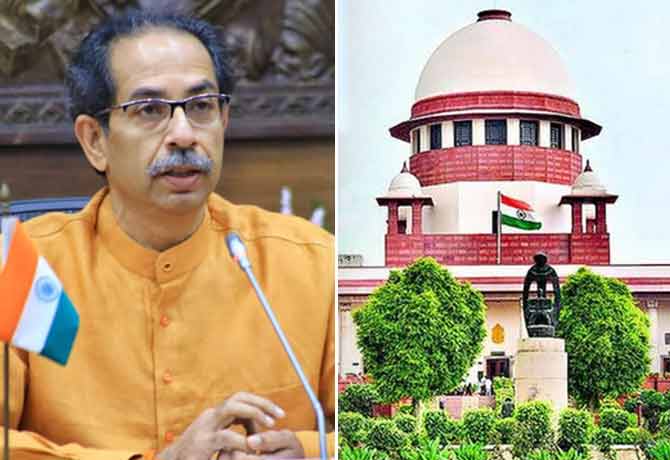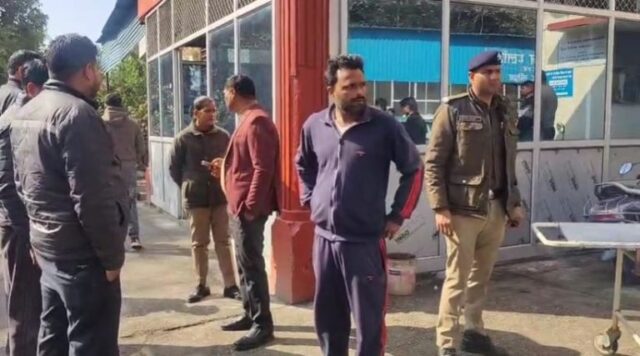Maharashtra : Shock to Uddhav Thackeray from Supreme Court

Court said- Election Commission will decide whose real Shiv Sena, Shinde faction has claimed party A Constitution Bench headed by Justice DY Chandrachud has lifted the stay on the proceedings of the Election Commission on the Shinde faction’s claim on the party.
Now the commission can decide on the election symbol of Shiv Sena. This is a big setback for Uddhav Thackeray, as Uddhav had demanded a stay on the proceedings of the Election Commission till the eligibility of the MLAs is decided in this matter.
Hearing Uddhav’s petition, on August 23, a bench of Justice NV Ramana stayed the proceedings of the Election Commission while transferring the case to the Constitutional Bench. Justice Ramana had said that the Constitutional Bench would decide whether the proceedings of the commission would continue or not. Earlier, the Election Commission had asked all the parties to respond by sending notices on the petition of the Shinde faction regarding the symbol.
Shivsena’s dispute started from June 20
The Shiv Sena controversy started on June 20, when 20 MLAs under Shinde’s leadership had moved to Guwahati via Surat. After this Shinde faction claimed to be with 39 out of 55 MLAs of Shiv Sena, after which Uddhav Thackeray resigned.
Shinde had denied the allegation of disqualification
During the last hearing, Chief Minister Eknath Shinde had said that the allegation of disqualification has been wrongly leveled against us. We are still Shiv Sainiks. On the other hand, in the Supreme Court, advocate Kapil Sibal, appearing for the Uddhav Thackeray faction, had said that MLAs going to Shinde faction can avoid disqualification under the 10th Schedule of the Constitution only if they merge the separated faction with another party. Huh. He said that there was no other way to save him.
Understand the full story of Maharashtra political crisis
- June 20: 15 Shiv Sena MLAs along with 10 independents left for Surat and then Guwahati.
- June 23: Shinde claims he has the support of 35 Shiv Sena MLAs. Letter issued.
- June 25: Deputy Speaker sends 16 rebel MLAs cancellation notices. The rebel MLAs reached the Supreme Court.
- June 26: In the hearing, Supreme Court sends notice to Shiv Sena, Centre, Maharashtra Police and Deputy Speaker. The rebel MLAs got relief from the relief court.
- June 28: Governor asks Uddhav Thackeray to prove his majority. Devendra Fadnavis had demanded this.
- June 29: Supreme Court refuses to stay the floor test, after which Uddhav Thackeray resigns as Chief Minister.
- 30 June: Eknath Shinde becomes the Chief Minister of Maharashtra. Devendra Fadnavis of BJP was made Deputy Chief Minister.
- July 3: The new speaker of the assembly gave recognition to the Shinde faction in the house. The next day Shinde won the trust vote.
- August 3: During the hearing, the Supreme Court said – have we postponed the hearing for 10 days, have you (Shinde) formed the government.
- August 4: SC said- As long as this matter is pending in the Supreme Court, the Election Commission should not take any decision.
- August 4: After hearing, the hearing of the case was postponed thrice. That is, before 23 August, the court did not give any decision on 8, 12 and 22 August.
- August 23: Case transferred to Constitution Bench in Supreme Court. The proceedings of the Election Commission were stayed.
- September 27: The Constitution Bench lifts the stay on the proceedings of the Election Commission in the matter of claim on Shiv Sena.
Three big cases were heard in the Constitutional Bench of the Supreme Court on Tuesday, know about the three cases
1. Uddhav Vs Shinde Shiv Sena Controversy: Justice DY Chandrachud said, ‘I want this dispute to be resolved soon. We want to see whether there is any contradiction between the Speaker’s jurisdiction and the Election Commission’s jurisdiction.
On this, senior advocate Abhishek Manu Singhvi said – The person who has filed the case in the Election Commission is not a member of Shiv Sena.
2. EWS Reservation: The hearing was held for the seventh day in the bench of Chief Justice UU Lalit in the Supreme Court. The government said that the breaking of the 50% barrier for giving reservation is shocking. On this, the petitioner’s lawyer Sankarnarayan said – this structure has been decided in the Supreme Court itself, it cannot be broken. The Supreme Court has reserved the verdict in the matter.
In January 2019, the central government had announced 10% reservation for economically backward general category people, which has been challenged in the Supreme Court.
3. LG Vs Delhi Government: The matter will now be heard in the Supreme Court in the Constitutional Bench of Justice DY Chandrachud in November. In this petition filed by the Delhi government, the power of the Lieutenant Governor has been challenged in the transfer-posting of officers.
Live streaming of constitution bench hearing started from today
Tuesday was a historic day for the Supreme Court. From today people will be able to watch live streaming of the hearing of the Constitution Bench. It started today with the Uddhav vs Shinde case. Senior advocate Kapil Sibal argued on behalf of the Uddhav faction. He said, ‘All this happened because of the court’s order of July 29. When the matter of disqualification is pending, how can the Election Commission decide on the symbol. On the other hand, the bench said that we want to resolve this matter soon.
SC has made arrangements for live streaming of hearing of cases before the Constitution Bench. These cases include EWS reservation, Maharashtra Shiv Sena dispute, Delhi-Centre dispute. In fact, only last week, the Supreme Court decided to do live streaming of the hearing.
In 2018, the then CJI of India gave permission for live streaming
Recently a court meeting was held under the chairmanship of CJI. In this, it was decided to live-stream the proceedings of all Constitution Bench hearings from September 27. Let us inform that on 27 September 2018, the then CJI of India Dipak Misra allowed live streaming of cases of constitutional importance. However, live streaming of proceedings of sexual harassment and matrimonial matters was not permitted.






